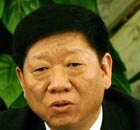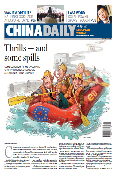Take multipronged approach
Updated: 2010-06-18 07:57
By Liu Junhong (China Daily)
For inflation-plagued developing countries, any withdrawal of stimulus packages early will possibly sabotage the world's joint efforts for global economic recovery and push it to hit bottom a second time round. However, their adherence to stimulus measures is also likely to brew a more serious bubble.
At the same time, developed countries' adherence to emergency measures will undoubtedly contribute to the flow of world capital to emerging markets, which will not only hamper their own efforts to extricate from a deflation scenario, but will also contribute to the expansion of bubbles in emerging markets.
The International Monetary Fund (IMF) has repeatedly stressed that the withdrawal of the counter-crisis stimulus packages should be made only after a sound financial infrastructure is set up across the world and after a market-driven economic recovery is achieved.
At the same time, the IMF has also called on member nations to conduct policy coordination and phase out stimulus packages in an arranged and negotiated way so as to jointly maintain global economic stability.
Germany, as a key player in maintaining European economic stability, has chosen to adopt a tight fiscal policy, abandoning its past tax reduction policy and taking no effective measures to boost domestic demand.
The largest European economy has also failed to take measures to promote balanced regional investment, rejuvenate industries and help expand exports of other members in the euro zone. These financial policies have aggravated the regional financial and fiscal instability.
The US, however, has chosen to aim at dominating the process of ongoing reform in global financial supervision and monitoring.
Preoccupied with its own export expansion, the world's largest economy recently declared it would first cut financial spending, a move mainly aimed at rejuvenating the dollar in defiance of other countries' efforts to pursue the stability of their currencies and finances.
Japan has closely focused on bagging more Asian infrastructure construction orders, an alluring cake at a time of economic slowdown. Tokyo's mercantile approach and its aggressive overseas expansion strategy in environmental protection and energy, which has accelerated the outflow of its funds, has made it more difficult for developing countries to implement policies aimed at containing inflation and bubbles.
The counter-crisis measures adopted by developed countries, together with brewing risks in international commodities and financial markets, will be unfavorable to policy coordination efforts agreed upon during previous G20 summits and global efforts to maintain world economic recovery.
The G20 has evolved into one of the most important venues for global policy coordination since the Pittsburgh Summit. At a time when the global economy is facing a "double dip" scenario - measured as inflation in developing countries and deflation in developed ones - ways to use the multilateral platform to promote sound financial strategies across the world and push for financial stability will determine future global economic recovery.
The author is a researcher with the China Institutes of Contemporary International Relations.
(China Daily 06/18/2010 page8)
Paper's Digest

Chinese jet takes on Big 2
First large commercial plane set to ride on demand for aircraft as economy grows.
Super-CPU only for domestic eyes
Specials

Gaining ground
Doing business in china for westerners has come a long way, Peter batey says.

Safeguarding environment a priority
China continues to face mounting pressure to curb environmental degradation, despite progress in reducing pollution over the last five years, the environmental protection minister warned.

Employment to remain a continuing challenge
China's top labor official said the country will face a tough employment situation in the next five years.
